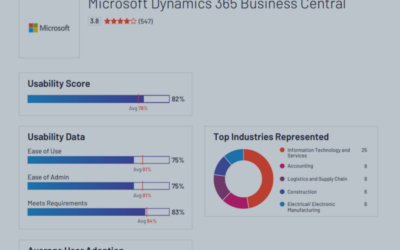Just a figment of our collective imagination until recently, Artificial Intelligence (AI) is now a driving trend in technology. According to Gartner, AI technologies adoption increased by 270% between 2015 and 2019. The global market for AI is expected to reach an estimated $267B by 2027, according to Fortune Business Insights.
One area in which AI is having an enormous impact is in Enterprise Resource Planning software, or ERP. What is the relationship between Enterprise Resource planning (ERP) and AI, and how can AI transform ERP? Let’s discuss.
Data Analytics & Forecasting
Data analytics and forecasting are crucial in ERP software, and AI takes these capabilities to the next level. AI assists ERP users by providing immediate insights on various aspects of a business. This includes its performance, customer behavior, and sales patterns.
AI in ERP harnesses historical data to generate accurate forecasts for future performance and requirements. This is especially valuable for seasonal or cyclical industries. AI algorithms analyze historical patterns and predict future downtimes and upticks. This helps businesses make informed decisions about their resources and inventory.
AI can analyze large amounts of data to find hidden patterns and connections that are not obvious to humans. These insights can reveal new opportunities, identify areas for improvement, and drive innovation. By extracting valuable insights from their data, businesses can fuel strategic decision-making, product development, customer targeting, and growth.
Managing the Supply Chain
AI in ERP systems provide better control over the supply chain. It analyzes data related to customer demand, market trends, and production schedules to gain actionable insights. AI-driven ERP systems help businesses manage their warehouses and stock efficiently, ensuring optimal stock levels and predicting demand fluctuations.
AI simplifies logistics by optimizing warehouse processes, order fulfillment, and route planning. It improves on-time delivery performance and minimizes transportation costs, enhancing customer satisfaction. Additionally, AI helps uncover and relieve supply chain disruptions, allowing businesses to take timely actions.
A Streamlined Business Office
AI in ERP brings the accounting department into the 21st century. It can quickly perform tasks like verifying reports and invoices. This not only reduces your staff’s workload, but it also eliminates manual processes and reduces errors.
AI in ERP streamlines accounting operations by automating tasks and eliminating manual data entry. It provides a centralized platform for managing financial data, facilitating collaboration and real-time insights. AI frees up accountants’ time by automating routine tasks, allowing them to focus on strategic activities. This empowers them to contribute more effectively to financial decision-making.
Enhancing the “Soft Touch”
AI in ERP enhances customer service and HR processes. AI automates HR tasks like onboarding, leave management, and evaluations, making them easier and consistent, reducing administrative work. Additionally, AI can assist in talent acquisition by automating resume screening and candidate shortlisting based on predefined criteria. This enables HR professionals to focus their time and efforts on interviewing and assessing the most qualified candidates.
In terms of customer service, AI-powered ERP systems provide complete customer data. This empowers customer service agents to deliver a better user experience.
With complete customer profiles readily available, agents can quickly access past interactions, preferences, and purchase history. This wealth of information enables personalized and tailored interactions, addressing customer needs more effectively. By leveraging AI, businesses can offer seamless and personalized customer experiences, leading to increased satisfaction and loyalty.
Limitations of AI in ERP
It’s true AI in ERP offers numerous benefits. Still, it’s important to recognize they are simply tools that still require human intelligence.
Think of them as a supplement for your team’s knowledge, rather than a replacement for it. Human analysts provide contextual understanding, expertise, and subjective assessments that AI may lack. They excel in handling novel situations, adapting to unexpected events, and considering non-quantifiable factors.
In conclusion, the combination of AI and ERP is transformative for business software. AI enhances data analytics, supply chain management, accounting, customer service, and HR processes. However, human intelligence remains essential for critical analysis, judgment, creativity, and adapting to complex situations. The synergy between AI and human intelligence maximizes the benefits of ERP systems.
What have your experiences with AI and ERP been? Let us know your thoughts in the comments below.
Are you ready to learn more about what an AI-driven ERP solution can do for you? Start by looking at some of the best options out there.




